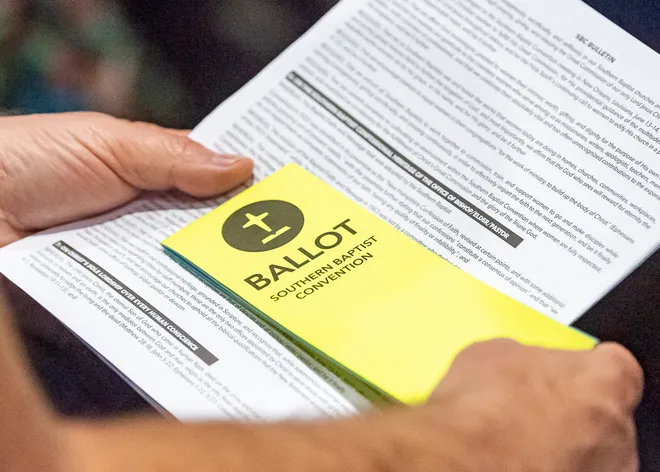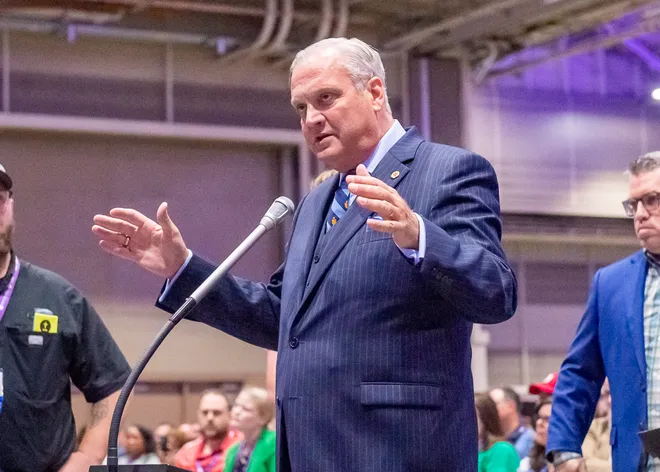Southern Baptists to debate measure opposing IVF following Alabama court ruling
- The Southern Baptist Convention will gather for its 2024 annual meeting in Indianapolis starting June 11. Resolutions on IVF, non-disclosure agreements, and separation of church and state are on tap.
To bolster an even more conservative stance on the definition of life among a key evangelical Christian constituency, the Southern Baptist Convention will take up a resolution opposing in vitro fertilization, or IVF.
The proposed measure comes on the heels of a pivotal Alabama Supreme Court ruling that frozen embryos are legally protected as children, a decision that set off a nationwide political debate due to its potential impact on abortion laws. The Alabama decision received praise from anti-abortion groups who have pushed for the definition of life as beginning at conception.
The SBC’s vote on the IVF resolution at the denomination’s annual meeting next week in many ways aligns with many Southern Baptists’ values. But it would also represent an affirmation of an idea championed by a select few thought leaders.
The SBC Resolutions Committee recommended the measure for approval after receiving a draft submitted by Al Mohler, president of the Southern Baptist Theological Seminary, and Southern seminary ethics professor Andrew Walker.

“The hard thing is that many who consider themselves to be pro-life have refused to extend their own logic to the huge moral crisis posed by IVF procedures,” Mohler said in a column for World magazine in February following the Alabama Supreme Court ruling.
Amid the backlash to the court ruling, the Republican-dominated legislature in Alabama carved out new rules aimed at protecting IVF providers.
Mohler’s column cited what he viewed as other potentially problematic components of IVF, such as that it allows same-sex couples or a single woman to have children. Mohler, a leading contemporary evangelical figure in the U.S., said he’s been opposing IVF for 20 years.

The SBC, the nation's largest Protestant denomination, has generally been silent about the medical technology, according to Religion News Service.
“A man plus a woman plus marriage is the right context for children to emerge with no moral complications,” Mohler said in his February column. “Any alienation from that context brings, at the very least, moral risk.”
Mohler has recently backed other ideas that resonate with some Southern Baptists but irked many others. Some examples are endorsing a proposed measure to enshrine a ban on women pastors and denouncing the guilty verdict in former President Donald Trump’s hush money trial.

SBC 2023 votes:Southern Baptists uphold ouster of Saddleback, Fern Creek churches over women pastors
For decades, the SBC has been a major force in the anti-abortion movement and helped frame the moral parameters for a conservative view of childbearing. Resolutions — non-binding statements that Southern Baptist voting delegates, called messengers, vote on every year — are one way the denomination has done that. Those resolutions inform advocacy work by the SBC’s public policy arm, the Ethics & Religious Liberty Commission.
In fact, the Ethics & Religious Liberty Commission recently wrote members of Congress advocating for policy priorities, including opposition to increased access to IVF.
The proposed resolution for the 2024 SBC annual meeting calls on Southern Baptists “to advocate for the government to restrain actions inconsistent with the dignity and value of every human being, which necessarily includes frozen embryonic human beings.”
Other items the SBC Resolutions Committee is recommending for approval include:
- Support for religious liberty instead of “favor of a state-mandated religion” in a counter to heightened appeal to Christian nationalist sentiments. Referring to the belief the U.S. was founded as a Christian nation, some leaders of an opposition conservative faction within the SBC have shown support for a marriage between conservative Christian ideas and government policies. This resolution will revisit a similar debate at the 2021 SBC annual meeting, when the denomination considered a resolution denouncing the Jan. 6 riot at the U.S. Capitol.
- Guidance for Southern Baptist churches and SBC-affiliated agencies, called entities, on using non-disclosure agreements or non-disparagement agreements, also known as NDAs. The resolution emerged from a broader conversation about some entities employing NDAs in cases of clergy sexual abuse and following a former mission board employee who criticized a pastor for espousing racist views.
- An acknowledgement of SBC leaders who have “engaged in public or private sin, abused their power, misused Convention funds, committed crimes, engaged in deception." The statement follows scandals involving prominent Southern Baptist leaders, such as Paul Pressler — a major leader in the Conservative Resurgence movement, who settled a lawsuit in December accusing Pressler of multiple cases of sexual abuse — and Paige Patterson, another Conservative Resurgence leader who continues to face criticism for reportedly covering up cases of sexual abuse and mismanaging finances during his tenure as president of Southwestern Baptist Theological Seminary in Fort Worth, Texas.
Liam Adams covers religion for The Nashville Tennessean, part of the USA TODAY Network. Reach him at ladams@tennessean.com or on social media @liamsadams.
Disclaimer: The copyright of this article belongs to the original author. Reposting this article is solely for the purpose of information dissemination and does not constitute any investment advice. If there is any infringement, please contact us immediately. We will make corrections or deletions as necessary. Thank you.






